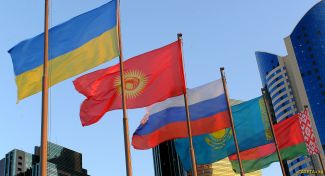
The eurasian conformity assessment
EAC certification and EAC declaration is a critical requirement for products entering the Eurasian Economic Union (EAEU), which consists of Russia, Belarus, Kazakhstan, Armenia, and Kyrgyzstan. This assessment process ensures that products meet specific quality and safety standards before entering the market. However, during times of international sanctions, obtaining EAC certification can become more challenging for businesses. This article explores the complexities of EAC certification during sanctions and offers guidance on how to navigate this intricate landscape.
Current EU and US sanctions against Russia
The EU and the US have imposed several rounds of sanctions against Russia since 2014 in response to the annexation of Crimea and the ongoing conflict in eastern Ukraine, human rights abuses, and other concerns. These sanctions primarily target individuals, entities, and sectors, with the aim of promoting a change in the policies and actions of the targeted countries.
The main components of these sanctions include:
a. Restrictive measures against individuals and entities: The EU has imposed asset freezes and travel bans on individuals and entities involved in actions that undermine or threaten the territorial integrity, sovereignty, and independence of Ukraine. These include government officials, military personnel, and separatist leaders.
b. Economic sanctions: The EU has targeted specific sectors of the Russian economy, including finance, energy, and defense. These sanctions restrict access to EU capital markets for certain Russian banks and companies, limit the export of certain goods and technology related to the energy sector, and impose an embargo on arms and military equipment.
c. Financial sector:
- SWIFT ban for certain Russian and Belarusian banks
- restricted access to EU primary and secondary capital markets for certain Russian banks and companies
- prohibition on:
- transactions with the Russian and Belarusian central banks, and with the Russian regional development bank
- the provision of euro-denominated banknotes to Russia and Belarus
- public financing or investment in Russia
- investment in and contribution to projects co-financed by the Russian Direct Investment Fund
d. Energy: price cap related to the maritime transport of crude oil and petroleum products and prohibition on:
- imports from Russia of coal
- imports from Russia of oil, with limited exceptions
- exports to Russia of goods and technologies in the oil refining sector
- new investments in the Russian energy and mining sector
- providing gas storage capacity (with the exclusion of the part of LNG facilities) to Russian nationals
e. Transport: closure of EU airspace to all Russian-owned and Russian-registered aircraft, closure of EU ports to Russian vessels.
Prohibition on:
- maritime transport of Russian oil to third countries (if bought above the price cap)
- Russian and Belarusian road transport operators from entering the EU
- exports to Russia of goods and technology in the aviation, maritime and space industry
f. Defence
Prohibition on exports to Russia of:
- dual-use goods and technology items
- drone engines
- arms and civilian firearms
- ammunition, military vehicles and paramilitary equipment
g. Raw materials and other goods
Prohibition on exports to Russia of luxury goods.
Prohibition on imports from Russia of:
- iron, steel, wood, cement and asphalt
- paper, synthetic rubber and plastics
- gold, including jewellery
- seafood, spirits, cigarettes and cosmetics
h. Services to Russia or Russian persons
Prohibition to provide:
- crypto asset wallet, account or custody services
- architectural and engineering services
- IT consultancy services and legal advisory services
- advertising, market research and public opinion polling services
- technical assistance, brokering services or financing or financial assistance (in relation to the maritime transport of Russian oil)
i. A prohibition on the provision of technical assistance or intermediary services, construction, or engineering services for infrastructure: It is forbidden to provide technical assistance or intermediary services, construction, or engineering services directly related to infrastructure: transport, telecommunications, energy, prospecting, exploration, and production of oil, gas, and mineral resources in the specified areas, regardless of the origin of the goods or technologies.
j. Sanctions related to Crimea and Sevastopol: The EU has imposed a range of sanctions in response to the illegal annexation of Crimea and Sevastopol. These measures include an import ban on goods from Crimea and Sevastopol, restrictions on investment and tourism, and a prohibition on the export of certain goods and services to the region.
Current EU and US sanctions against Belarus
The EU and US have also imposed sanctions on Belarus due to its involvement in the Russian invasion of Ukraine, as well as on Iran for supplying drones to Russia as well as due to concerns over human rights abuses, repression of political opposition, and the fraudulent 2020 presidential election. The main components of these sanctions include:
- Restrictive measures against individuals and entities: The EU has imposed asset freezes and travel bans on government officials, law enforcement personnel, and other individuals involved in human rights abuses, repression of civil society, and electoral fraud in Belarus. These measures also target entities that provide financial support to the Belarusian regime or are involved in human rights abuses.
- Sectoral sanctions: The EU has imposed sanctions on specific sectors of the Belarusian economy, targeting state-owned enterprises and industries that are considered to be financially supporting the regime. These measures include restrictions on trade in petroleum products, potash, and tobacco products, as well as prohibitions on providing insurance and reinsurance services to the Belarusian government and state-owned enterprises.
- Arms embargo: The EU has imposed an embargo on the export of arms and military equipment to Belarus, as well as a ban on the export of equipment that can be used for internal repression.
- Dual-use goods and technology restrictions: The EU has imposed restrictions on the export of dual-use goods and technology that could be used for military purposes or to repress civil society in Belarus.
Sanctions and their impact on EAC certification
The sanctions imposed by the EU and the US against Russia and Belarus including trade embargos, asset freezes, and restrictions on financial transactions can directly affect the EAC certification process. This is because they create obstacles for both applicants and certifying bodies, including:
- Financial restrictions: Sanctions can impose restrictions on financial transactions, making it difficult for businesses to pay fees associated with EAC certification.
- Delays in the certification process: The certification process may be delayed due to additional scrutiny and administrative procedures related to the sanctions.
- Limited access to certifying bodies: Many certification bodies and testing laboratories accredited in the field of EAC Certification are located on the territory of Russia and Belarus. This makes product testing difficult, resulting in limited options for businesses seeking EAC certification.
- Supply chain disruptions: Sanctions disrupt supply chains, making it difficult for businesses to provide the delivery of samples for testing purposes in the testing laboratory, which increases the cost and time for passing the necessary tests.
- Due to visa restrictions, it is difficult for experts from certification bodies to travel outside the Eurasian Union to conduct production tests or to carry out inspection control.
Caution! Violating the sanctions regime against Russia and Belarus carries severe consequences for European companies, ranging from financial penalties and reputational damage to legal consequences. To avoid these risks, it is crucial for businesses to stay informed about the latest developments in the sanctions landscape and ensure compliance with all relevant regulations.
How do we help businesses to adopt several strategies to navigate the EAC certification?
Helping businesses adopt various strategies to navigate the EAC certification process is essential for their success in the EAEU market. During times of sanctions, we help businesses overcome the challenges associated with EAC certification and sanctions, ensuring their continued growth and success in the region.
- Evaluate alternative markets: Consider entering markets that are not directly affected by sanctions, where obtaining EAC certification may be less complicated. We propose to carry out conformity assessment in Kazakhstan. Our company already has an office in Kazakhstan, able to organize testing of product samples and conduct EAC-Certification, and to take on the duties of an authorized representative.
- Stay informed: Regularly monitor updates on sanctions and their potential impact on EAC certification processes. This will allow businesses to anticipate and respond to any changes that may affect their certification efforts. We help our clients stay up to date with the latest legislative developments through individual consultations, workshops, seminars or our newsletter.
- Seek guidance from experts: Engage with our experienced consultants who specialize in EAC certification and sanctions compliance. They can provide valuable advice on navigating the complex landscape and ensuring compliance with relevant regulations, in order to be able to carry out the EAC certification in a legally compliant and risk-free manner.
- Diversify supply chains: Reduce reliance on providers from sanctioned countries. For example, it is possible to transfer the responsibility for conducting inspection control to certification bodies located outside of Russia or Belarus and thus preserve the existing EAC certificates of conformity.
- Streamline the Certification Process: Assisting businesses in streamlining the EAC certification process can save time and resources. By identifying potential bottlenecks, simplifying documentation, and ensuring that all necessary requirements are met, companies can avoid delays and complications in obtaining certification. We offer businesses access to tools, templates, and checklists that simplify the EAC certification process and ensure that all requirements are met.
Conclusion
The EU and US sanctions against Russia and Belarus serve as an important tool to promote human rights, democracy, and the rule of law in these countries. While the sanctions have had varying degrees of impact on the targeted countries, they remain an essential instrument for the EU to exert pressure and encourage positive change. Businesses and individuals operating in or dealing with Russia and Belarus must stay informed about the latest developments in the sanctions landscape and ensure compliance with all relevant regulations.
Obtaining EAC certification during times of international sanctions can be a complex and challenging process. However, by staying informed, seeking expert guidance, and adopting strategic approaches, businesses can successfully navigate this landscape and maintain access to the valuable.
We help companies around the Globe implement robust compliance programs and get expert guidance to navigate the complex sanctions regime and maintain their business operations without running afoul of the law.





